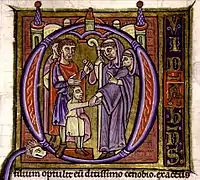Simony
Simony (/ˈsɪməni/) is the act of selling church offices and roles or sacred things. It is named after Simon Magus,[1] who is described in the Acts of the Apostles as having offered two disciples of Jesus payment in exchange for their empowering him to impart the power of the Holy Spirit to anyone on whom he would place his hands. The term extends to other forms of trafficking for money in "spiritual things".[2][3]

The appointment of ecclesiastical officials, such as bishops and abbots, by a secular authority came to be considered simoniacal and this became a key issue during the Investiture Controversy.
Etymology
The origin of the term "simony" is 8:9, 13,18-24:
But there was a certain man, called Simon, which beforetime in the same city used sorcery, and bewitched the people of Samaria, giving out that himself was some great one:... Then Simon himself believed also: and when he was baptized, he continued with Philip, and wondered, beholding the miracles and signs which were done... And when Simon saw that through laying on of the apostles’ hands the Holy Ghost was given, he offered them money, saying, Give me also this power, that on whomsoever I lay hands, he may receive the Holy Ghost. But Peter said unto him, Thy money perish with thee, because thou hast thought that the gift of God may be purchased with money. Thou hast neither part nor lot in this matter: for thy heart is not right in the sight of God. Repent therefore of this thy wickedness, and pray God, if perhaps the thought of thine heart may be forgiven thee. For I perceive that thou art in the gall of bitterness, and in the bond of iniquity. Then answered Simon, and said, Pray ye to the Lord for me, that none of these things which ye have spoken come upon me.
Thus, Simon's name came to be applied to the practice of selling church offices for money.
Catholic Church
 |
| Part of a series on the |
| Canon law of the Catholic Church |
|---|
|
|
Although an offense against canon law, simony became widespread in the Catholic Church in the 9th and 10th centuries.[4] In the canon law, the word bears a more extended meaning than in English law. "Simony according to the canonists", says John Ayliffe in his Parergon,[5]
...is defined to be a deliberate act or a premeditated will and desire of selling such things as are spiritual, or of anything annexed unto spirituals, by giving something of a temporal nature for the purchase thereof; or in other terms it is defined to be a commutation of a thing spiritual or annexed unto spirituals by giving something that is temporal.[5]
In the Corpus Juris Canonici, the Decretum[6] and the Decretals of Gregory IX[7] dealt with the subject. The offender whether simoniacus (the perpetrator of a simoniacal transaction) or simoniace promotus (the beneficiary of a simoniacal transaction), was liable to deprivation of his benefice and deposition from orders if a secular priest, or to confinement in a stricter monastery if a regular. No distinction seems to have been drawn between the sale of an immediate and of a reversionary interest. The innocent simoniace promotus was, apart from dispensation, liable to the same penalties as though he were guilty.[5]
Certain matters were simoniacal by the canon law but would not be regarded as such in English law.[lower-alpha 1] So grave was the crime of simony considered that even infamous persons (deprived of citizens' rights due to conviction) could accuse another of it. English provincial and legatine constitutions continually assailed simony.[5]
In 1494 a member of the Carmelite order, Adam of Genoa, was found murdered in his bed with twenty wounds after preaching against the practice of simony.[8]
 Abbot practising simony (France, 12th century)
Abbot practising simony (France, 12th century) Girolamo and cardinal Marco Corner investing Marco, abbot of Carrara, with his benefice, Titian, c. 1520
Girolamo and cardinal Marco Corner investing Marco, abbot of Carrara, with his benefice, Titian, c. 1520
In literature
In the 14th century, Dante Alighieri depicted the punishment of many "clergymen, and popes and cardinals" in hell for being avaricious or miserly.[9]
He also criticised certain popes and other simoniacs:[10]
Rapacious ones, who take the things of God,
that ought to be the brides of Righteousness,
and make them fornicate for gold and silver!
The time has come to let the trumpet sound
for you; ...
Church of England
| Political corruption | ||||||||||||
|---|---|---|---|---|---|---|---|---|---|---|---|---|
| Concepts | ||||||||||||
| Corruption by country | ||||||||||||
|
||||||||||||
The Church of England struggled with the practice after its separation from Rome. For the purposes of English law, simony is defined by William Blackstone as "obtain[ing] orders, or a licence to preach, by money or corrupt practices"[11] or, more narrowly, "the corrupt presentation of any one to an ecclesiastical benefice for gift or reward".[12] While English law recognized simony as an offence,[13] it treated it as merely an ecclesiastical matter, rather than a crime, for which the punishment was forfeiture of the office or any advantage from the offence and severance of any patronage relationship with the person who bestowed the office. Both Edward VI and Elizabeth I promulgated statutes against simony, in the latter case through the Simony Act 1588. The cases of Bishop of St. David's Thomas Watson in 1699[14] and of Dean of York William Cockburn in 1841 were particularly notable.[15]
By the Benefices Act 1892, a person guilty of simony is guilty of an offence for which he may be proceeded against under the Clergy Discipline Act 1892. An innocent clerk is under no disability, as he might be by the canon law. Simony may be committed in three ways – in promotion to orders, in presentation to a benefice, and in resignation of a benefice. The common law (with which the canon law is incorporated, as far as it is not contrary to the common or statute law or the prerogative of the Crown) has been considerably modified by statute. Where no statute applies to the case, the doctrines of the canon law may still be of authority.[5]
As of 2011, simony remains an offence.[16] An unlawfully bestowed office can be declared void by the Crown, and the offender can be disabled from making future appointments and fined up to £1000.[17] Clergy are no longer required to make a declaration as to simony on ordination, but offences are now likely to be dealt with under the Clergy Discipline Measure 2003,[18] r.8.Halsbury 2002, 1359
See also
Notes
- For example, the sale of tithes, the taking of a fee for confession, absolution, marriage or burial, the concealment of one in mortal sin or the reconcilement of an impenitent for the sake of gain, and the doing of homage for spiritualities.
- The Reader's Encyclopedia (1965), New York: Thomas Y. Crowell Company, vol.2, p.932, "Simon."
- Smith 1880.
- Halsbury 2002, 832.
- Merriam-Webster's Encyclopedia of World Religions, edited by Wendy Doniger, 1999
- Chisholm 1911, p. 133.
- Chisholm 1911, p. 133 cites Pt. ii. cause i. quest. 3
- Chisholm 1911, p. 133 cites Bk. v. tit. 3.
- Burckhardt, Jacob (1878). The Civilization Of The Renaissance in Italy. University of Toronto - Robarts Library: Vienna Phaidon Press. p. 60. Retrieved 28 February 2019.
- Inferno, Canto VII, line 47, Mandelbaum translation.
- Inferno, Canto XIX, lines 2–6, Mandelbaum translation
- Blackstone, William (1765). Commentaries on the Laws of England vol I. Oxford: Clarendon Press. pp. 376–7.
- Blackstone, William (1769). Commentaries on the Laws of England vol IV. Oxford: Clarendon Press. p. 62.
- 3 Coke's Institutes 153–156
- Handley 2004.
- The Times, 10 April 1841, p.6 col.b, reprinted from the Cambridge Advertiser
- Halsbury 2002, 832 & 1359
- Simony Act 1588, s.4
- 2003 No.3
References
- Handley, S. (2004). "Watson, Thomas (1637–1717)". Oxford Dictionary of National Biography (online ed.). Oxford University Press. doi:10.1093/ref:odnb/28868. (Subscription or UK public library membership required.)
- Clashfern, Lord Mackay of, ed. (2002), Halsbury's Laws of England, 14 (4th ed.) "Ecclesiastical Law", 832 'Penalties and disability on simony'; 1359 'Simony' (see also current updates)
- Smith, W. (1880). "Simony". A Dictionary of Christian Antiquities: Being a Continuation of the 'Dictionary of the Bible'. J.B. Burr Pub. Co.
Attribution:
 This article incorporates text from a publication now in the public domain: Chisholm, Hugh, ed. (1911). "Simony". Encyclopædia Britannica. 25 (11th ed.). Cambridge University Press. pp. 133–134.
This article incorporates text from a publication now in the public domain: Chisholm, Hugh, ed. (1911). "Simony". Encyclopædia Britannica. 25 (11th ed.). Cambridge University Press. pp. 133–134.
External links
| Look up simony in Wiktionary, the free dictionary. |
- Macdonell, George Paul (1885). . Dictionary of National Biography. 2. pp. 279–281.
- Weber, N.A. (1912). . Catholic Encyclopedia. 14.
- Thomas Aquinas. "Summa Theologica: Simony (Secunda Secundae Partis, Q. 100)". New Advent. Retrieved 21 June 2020.